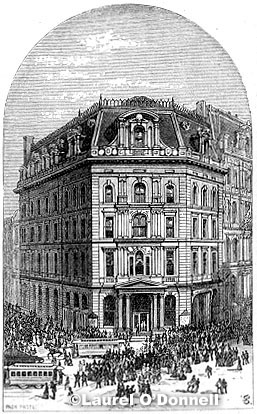|
|
The Metropolitan Newspaper, continued
Clustered among scores of other publishing offices, loomed the buildings of the Tribune, the Herald, the Sun, the World, and the Times, white wreaths of steam rolling up from their roofs and from the gratings over the press-rooms. The press-rooms extended beyond the buildings under the sidewalk, and the pavement vibrated with the beat of the machines, which were already tossing off parts of the papers, the insides or the outsides, leaving a reserve of space for the news that might arrive afterward. Where the heat had penetrated the hard flags, some newsboys had curled themselves in innocence and dirt. Others lay asleep on the steps, where the most important and most hurried of the larger contributors to journalism kindly forbore from disturbing them. Occasionally a telegraph messenger dived into the entrance of a building, then an errand-boy from the post-office with a pile of newspapers and letters, and then a reporter from some late meeting up town. As a matter of appearance more than anything else — as the last "form" admitting advertisements had long since closed — a clerk sat in the advertising office, on the ground-floor, and drowsed wit lights half down. The two gentlemen entered one of the offices, and began to ascend that long stairway by which all editorial rooms are attained, custom and economy invariably putting editors in a garret, whence they may look down, physically and mentally, on the world they write about. More telegraph boys, compositors, proof-readers, and reporters passed the visitors on the stairs, who, when they had explained their business to an inky office-boy, were admitted into the sanctum sanctorum of a celebrated morning paper.
A close, low-roofed, smoky room, lighted by innumerable Argand burners, and filled with little desks, at which sat, stooping, busy men, puffing cigars or pipes, and scribbling with pens or pencils at lightning speed--that was the next scene opened to them. On some of the desks there were piles upon piles of newspapers from points as far apart and as varied as the capitals of Europe and plaintive outposts on the far Western plains. A little tin box shot up and down a wooden shaft in the middle of the room, into which rolls of manuscript were put by an office-boy, who rushed from desk to desk and gathered the sheets as they came from the writers' hands. From time to time a nervous, sharp-voiced, imperative gentleman, in a very much soiled linen duster, called to one or the other of the workers, and gave orders which would have been quite unintelligible to a layman, who might have mistaken the establishment for a slaughter-house when he heard a pale-faced |
||
|
Page 2
Books & articles appearing here are modified adaptations
from a private collection of vintage books & magazines. Reproduction of these pages is prohibited without written permission. © Laurel O'Donnell, 1996-2006.
|
|||



